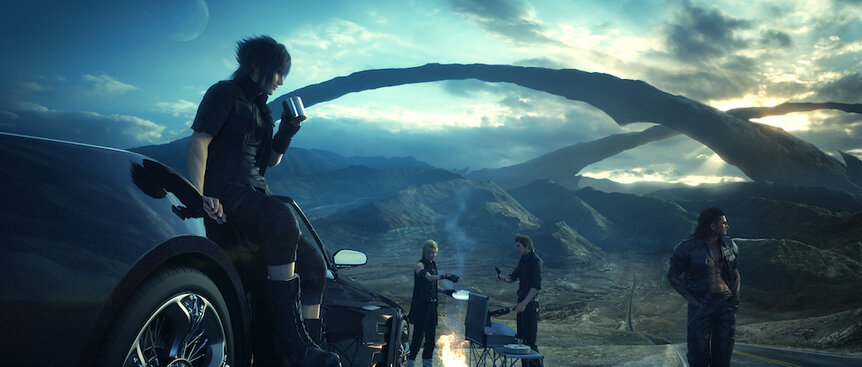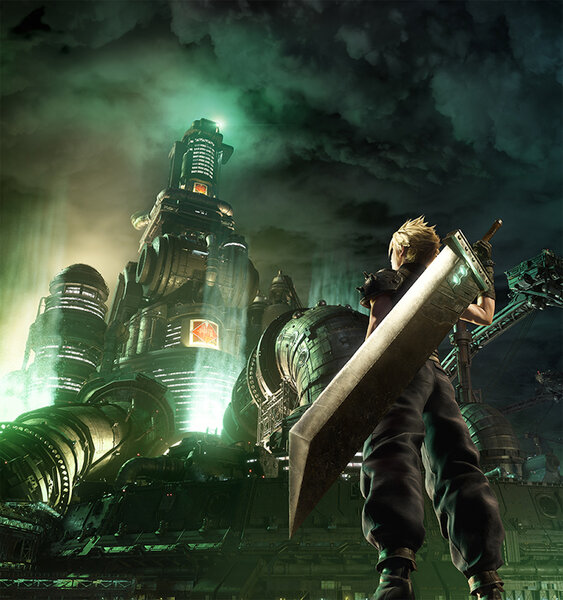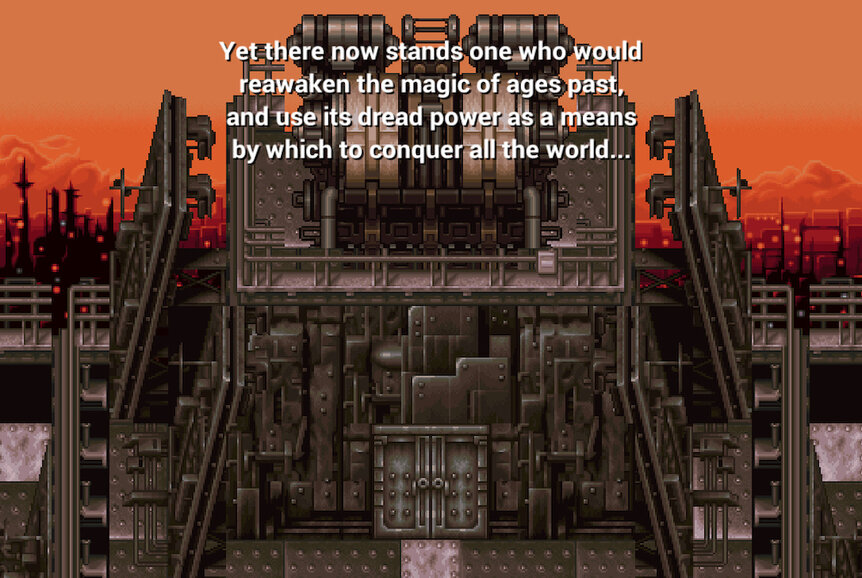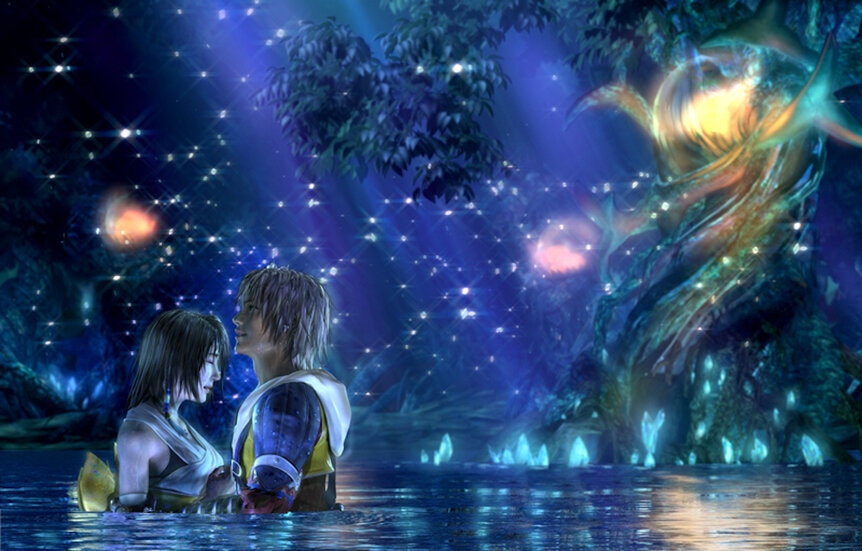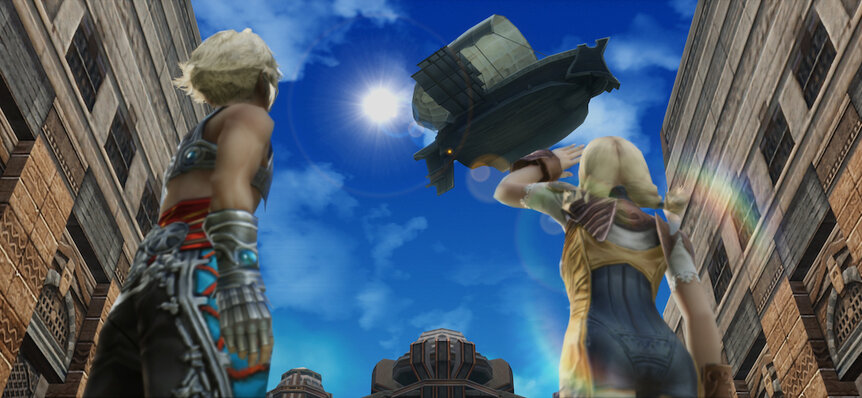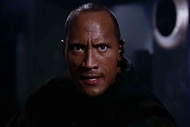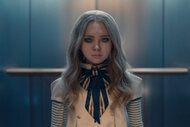Create a free profile to get unlimited access to exclusive videos, sweepstakes, and more!
5 'Final Fantasy' games that you wish were turned into movies
From defying the gods to endless love, Square Enix knows how to spin an RPG tale.
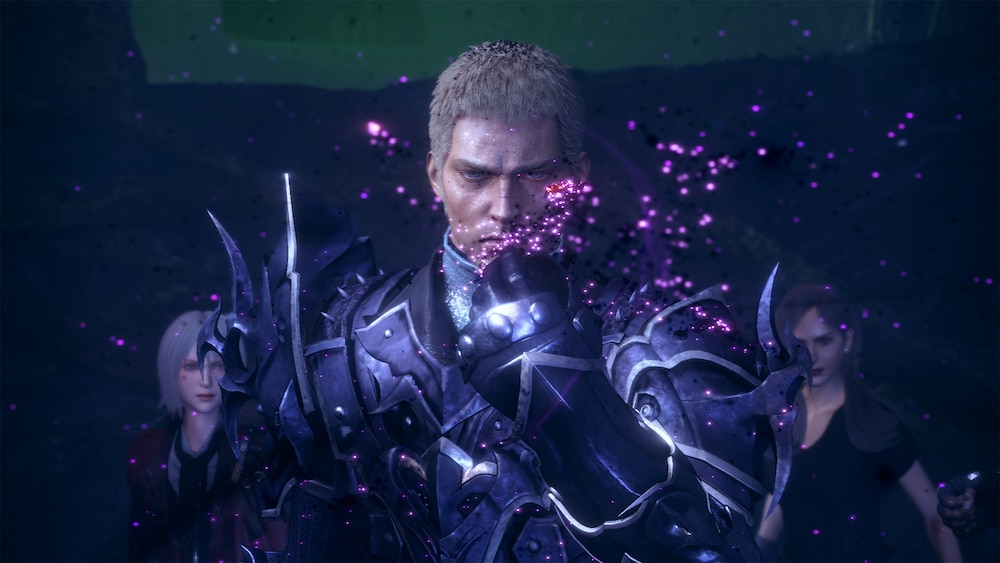
When Final Fantasy first debuted in 1987 on the Nintendo Entertainment System, crafting a cinema-grade RPG story wasn’t exactly a key design objective for series creator Hironobu Sakaguchi. Making a fun swords-and-sorcery game that could save Square — the wayback predecessor of today’s Square Enix studio — was literally the final, last-gasp goal.
How times have changed. Thirty-five years and 15 numbered Final Fantasies later, Square Enix now pals around with Disney to make crossover blockbusters like Kingdom Hearts, even as the studio forges ahead with development on Final Fantasy XVI — a hugely anticipated title far removed from the spotlight-free obscurity of its modest NES ancestor. And those cartoonish, pixel-sprite characters from the very first Final Fantasy? They’re getting a major modern-day upgrade in Stranger of Paradise: Final Fantasy Origin, a new parallel-universe take on the game that started it all. This time, though, hero Garland (who now goes by “Jack”) is all beefed up in full CGI glory, the central player in a fully-explored game story that paints to the edges the lore canvas that the 1987 original mostly, by necessity, left blank.
Now that he’s ready for a long-delayed date with current-gen consoles, where will Garland take these new Warriors of Light? With the game having arrived on March 15, we’re all set to find out. But Square Enix’s tweak on a familiar Final Fantasy story got us to thinking about all the other Final Fantasy games that came pre-loaded with great stories of their own — tales so good, in fact, that they probably deserve a shot at the big screen.
For a game franchise that now packs more than a movie’s worth of lavishly rendered cutscenes into every release, Final Fantasy actually has a pretty slight track record at the movies. A pair of early-2000s films — the groundbreaking CGI standalone Final Fantasy: The Spirits Within (2001) and Final Fantasy VII: Advent Children (2005) — still enjoy a cult following today, but they never really sparked a consistent trend of putting Final Fantasy in theaters. We think, though, that it’s past time to give the franchise a fresh shot at movie stardom — and we’ve got five Final Fantasies to prove it. Each and all, their RPG stories need nary a dab of makeup to get ready for the theater's red carpet.
1. Final Fantasy XV
Final Fantasy XV evokes the movies right from the start, cueing up the eponymous theme to Stand By Me as four friends — one of them a prince — push their busted land yacht of a supercar down a desert highway right in the game’s opening frames. And however you feel about how FFXV turned out as an actual role-playing game, the story setup fits perfectly: This bro quartet’s epic road trip made sideways swerves that veered into surprisingly poignant human drama.
Ignis, Prompto, Gladius, and Prince Noctis: The all-male gang that anchors FFXV’s story grows up before our eyes as world-sweeping events yank them out of their lighthearted teens and into adulthood at breakneck speed. By the end of the journey, one’s gone blind; another’s discovered he’s not even human, and still another essentially trades his life to save his pals (and the entire world, of course). Final Fantasy XV is really a story about sacrificing it all, and not for some high ideal or lofty abstract concept — but for the friend standing right next to you, fighting to his last breath to return the favor.
2. Crisis Core: Final Fantasy VII
Okay, maybe we're cheating a little here: Crisis Core: Final Fantasy VII might not be a mainline Final Fantasy title, but with a tightened plot that kept the focus on the characters, it addressed one of the biggest issues of the iconic game that inspired it.
The original Final Fantasy VII will always be a classic, but its sprawling story does end up meandering to every far-flung corner of its enormous world. In short, it’s easy, even for seasoned fans, to lose their bearings.
That's where this spinoff, made for Sony's sadly departed handheld PSP, comes in. Crisis Core trimmed the FFVII fat with a prequel story that followed the tragic life of SOLDIER-in-training Zack Fair as he strives to become like his hero, Cloud Strife — and ends up getting more than anyone in Midgar could’ve bargained for. Zack uncovers the sad fates of three Shinra supersoldiers, following them down the rabbit hole as they seek their possibly-sueprnatural, possibly-extraplanetary origins...but he gets so deeply embroiled with the process that there’s really only one way things can end. From Aerith’s placid acceptance of being the last of an extinct ancient race, to Sephiroth’s madness in trying to reconnect with his maker, Final Fantasy VII was always about the crippling frustration of being unable to touch your own past — and Crisis Core put a human face to that in a way the original FFVII never quite did.
3. Final Fantasy VI
Sephiroth’s murder of Aerith in Final Fantasy VII came as a mouth-gaping shock to fans. But anyone who’d played the previous game already knows of the lengths Square would go in the service of a good story. Aerith was a key character, after all…but she wasn’t, y’know, the whole world.
That’s pretty much what gets wiped away midway through the story of Final Fantasy VI, a game whose technical limitations on the Super NES are just crying out for a modern-day do-over. The story at the heart of FFVI is high-concept stuff, pulling no punches in showing the fallacy of viewing technology as a one-sided savior. Kefka, the main villain, is a synthetically-created Magitek Knight, and it’s an open question how much of his world-destroying madness stems from his experimental origins rather than his own will. Either way, his vaguely Joker-esque court jester persona pairs with his unraveling mental state to make him one of the great villains of the entire Final Fantasy series.
Casting for a FFVI movie would be a challenge we wouldn’t wish on our worst enemy (not even Kefka): The contrast between his evil insanity and main character Terra Branford’s growing confidence is more nuanced than a simple good-versus-evil face-off. Both were coded from the start to be something more than human — yet each takes a different moral path in swerving farther and farther from a seemingly foreordained destiny.
4. Final Fantasy X
Love stories. Final Fantasy is filled with them, yet no game in the series makes romance such a key narrative centerpiece like Final Fantasy X.
The iconic image of a hopefully-resigned Tidus and weeping Yuna, embracing at a moment when their time together is about to lapse into memory, does the heavy lifting of a full-on movie poster in giving newcomers, just at a glance, the thematic setup for its love story doomed by fate.
Like most Final Fantasy games, FFX catches its characters up in a sweeping plot of good and evil. But unlike many, it uses that bigger conflict mostly as a backdrop to frame what really matters: Yuna’s bitter dread at losing something — someone — she was never meant to have at all. As a summoner, sending spirits to their eternal repose might be her day job, but there’s nothing routine about the one you love being disappeared from your world for good. There’s a certain acceptance of fate that suffuses FFX’s out-of-time love story; one that contrasts starkly against the game’s beach paradise setting of Spira. Where other Final Fantasies goad their characters to challenge the gods themselves, FFX resigns its heroes to fight on turf they know they can’t control. They do it anyway — but no Final Fantasy hero has ever felt victory’s bittersweet cost quite the way Yuna has.
5. Final Fantasy XII
Balthier. Basch. Reddas. Gabranth. Unlike a lot of games (and movies too), both the good guys and the bad guys in Final Fantasy XII’s huge character ensemble aren’t just there to serve as mutual antagonists. Nope, they’re some of the most genuinely principled people ever to inhabit a video game.
FFXII's world-on-the-move themes are epically big, but the real drama plays out in the way each character brings an unbending will to every conflict. Even Vayne, the main villain, has his own good reasons for wanting to seize from the gods the reins of history and put them "back in the hands of man." And the good guys — anchored by the complementing moral codes of sky pirate Balthier and fallen soldier Basch — truly believe in doing the right thing every single time…even if it means losing their dignity — or their heads.
Balancing the pressure from both sides frames the moral dilemma facing Ashe, a widowed princess bereft of her tiny, desert oasis of a stolen kingdom: Should she summon what amounts to divine nuclear annihilation to avenge what’s been lost? The ghost of her dead husband seems to think so, and it's the question that hovers to the very end.
Thanks to the way FFXII vividly brings to life the land of Ivalice, the game’s continent-spanning world, there’s real impact to her choice, too: Square Enix probably hasn’t created another lore-verse as fully lived-in and well-realized; a place where swords and armor truly feel like perfectly logical companions to giant airships and techno-infused magic. All we ask from a FFXII movie is that Square reunite the key creators that made it all fit together, from composer Hitoshi Sakimoto to the English localization team of Alexander O. Smith and Joseph Reeder. Bringing back a voice cast with standouts like Gideon Emery and John DiMaggio (aka Futurama’s Bender) definitely wouldn’t hurt, either.
